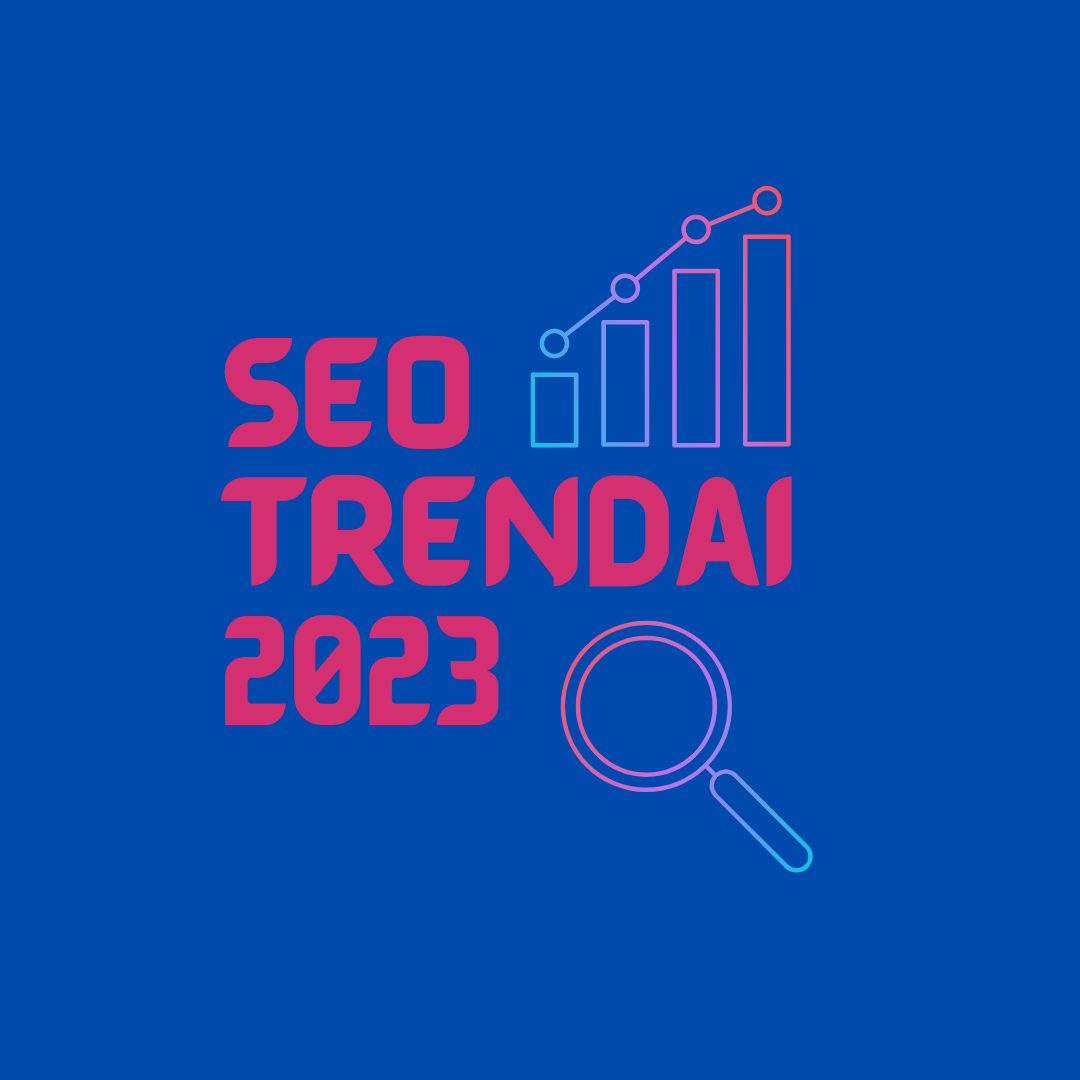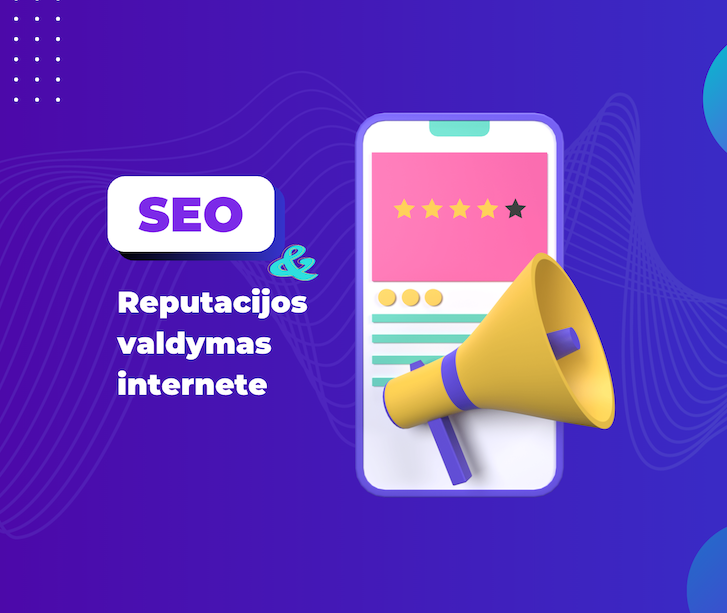Local SEO is the key if you want to attract more customers to your local business through organic search. But what is local SEO, exactly how does it work and the ranking factors that matter?
Find out how to rank your business in local search to attract more customers in this guide:
- Local SEO basics
- Local SEO keyword research
- Local SEO ranking factors
- Local SEO tools
1. Local SEO basics
Let's start by getting to know local SEO, why it's important and how it differs from " traditional" SEO.
What is local SEO?
Local SEO is the practice of improving your online presence to get more customers through local searches. These searches take place on many search engines, but local SEO mostly focuses on optimizing Google users.
Why is local SEO important?
Local SEO is important because many people use search engines to find local businesses.
In fact, according to Google:
- 30% of all mobile searches are location-related.
- 78% of people who use their phones to search for something nearby visit the business within a day.
- 28% of searches at a nearby location result in a purchase.
In short, customers are looking for your business. If you're not there, you're not winning.
How does local SEO work?
Local SEO is a two-part game because Google displays two types of local search results. These are 'map pack' results and organic 'blue link' results. You can evaluate both.
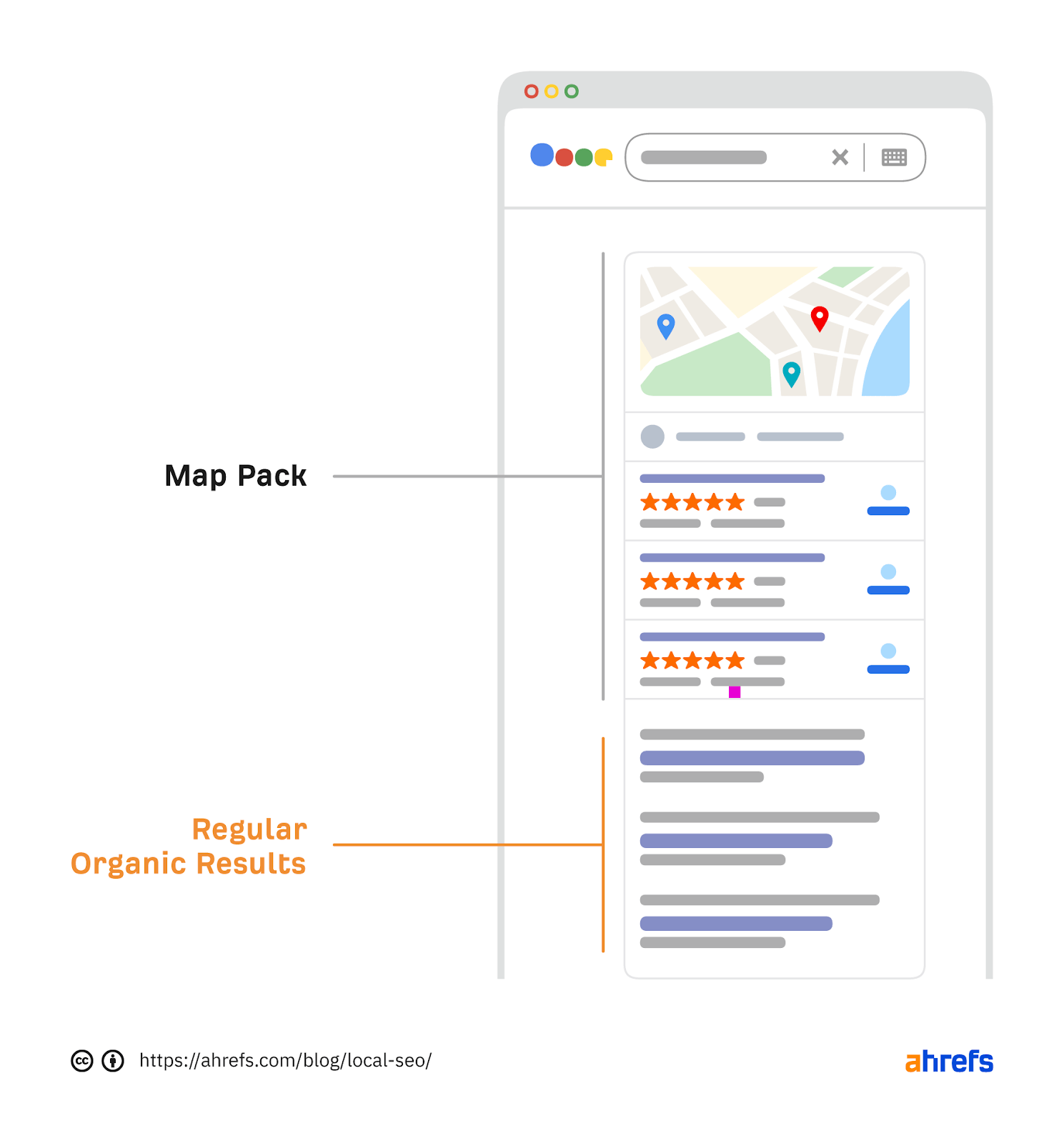
Map pack results
The map pack (aka local pack) is a Google SERP feature that displays the top local business listings and a map. It often appears at the very top of Google's search results when you do a local search.
Organic search results
The " typical" organic search results are the "10 blue links" that we all know. They usually appear below the "map pack" results.
2. Local SEO keyword research
Local keyword research is the process of understanding how people search for the local services you offer.
This is important because you want to optimize what people are searching for.
Let's take a look at how to do this.
Step 1. Find service-based keywords
Many people don't think about the different ways in which others might search for what they do.
For example, if you are a plumber, some customers will find you by typing "plumber" into Google. But others will search for queries related to specific services, such as 'unblocking leaks'.
For this reason, you should start by brainstorming and listing the services you offer. This will help you to maximize your presence in the queries that your customers are looking for.
Here's what this might look like for a plumber:
- Unblocking leaks
- Boiler repairs
- Boiler installation
- Boiler servicing
- Radiator installation
- Repair of burst pipes
To expand this list, use the service keywords as a starting point to find more of the services people are looking for.
For example, if we connect the above services to Ahrefs' Keyword Exlorer and check the Matching terms report, we will see the following keywords:
- gas boiler installation
- combi boiler installation
- electric boiler installation
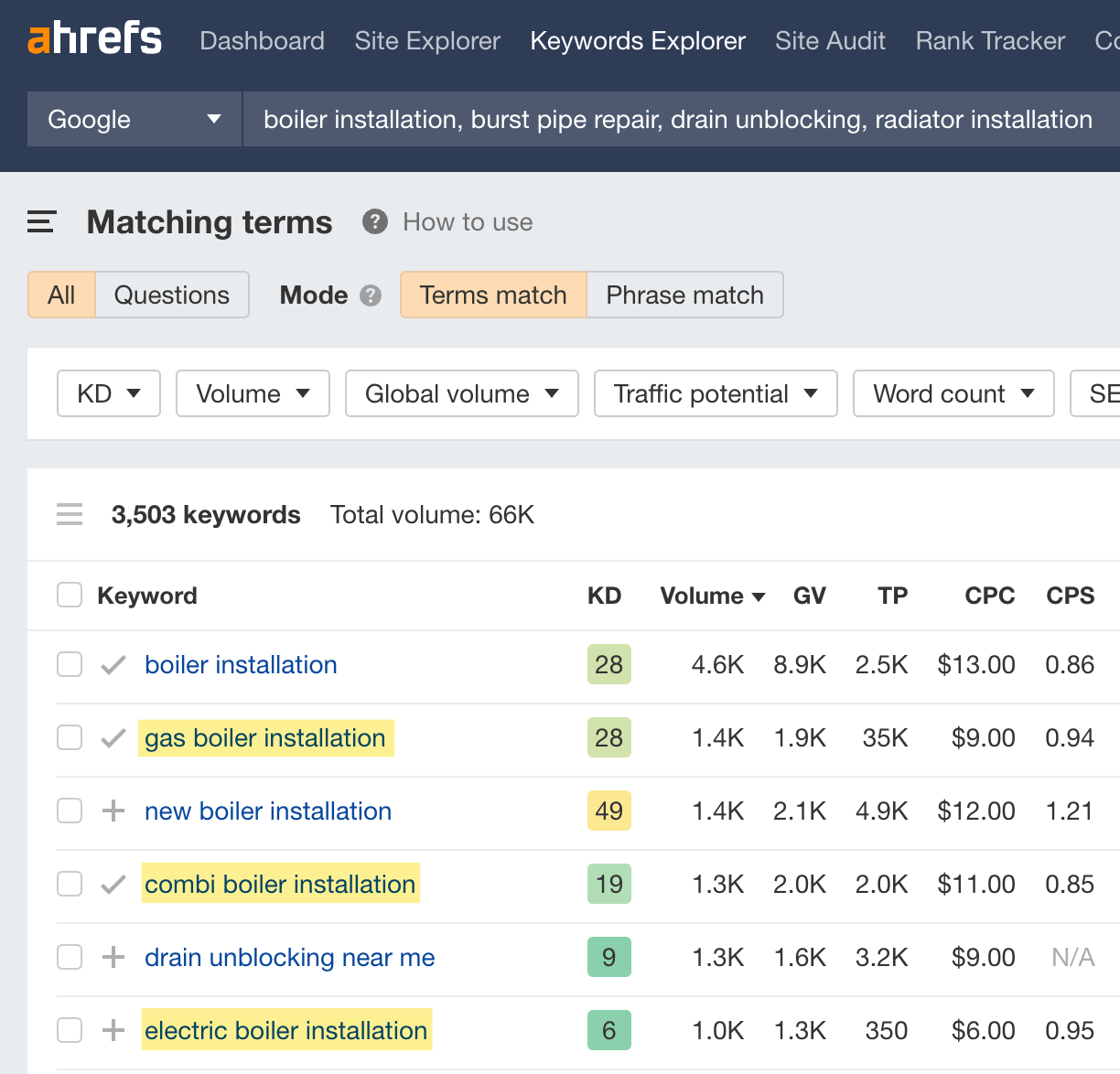
If you offer these services, you might want to include the relevant keywords.
Another way to find "missed" keywords:
Connect a competing company to Ahrefs' Site explorer, go to the Top Pages report and search for pages related to the services.

Step 2. Check the search volume
Keyword research tools show national search volume. If you want to check the search volume in your state, city or town, you will need to use the Google Keyword Planner tool.
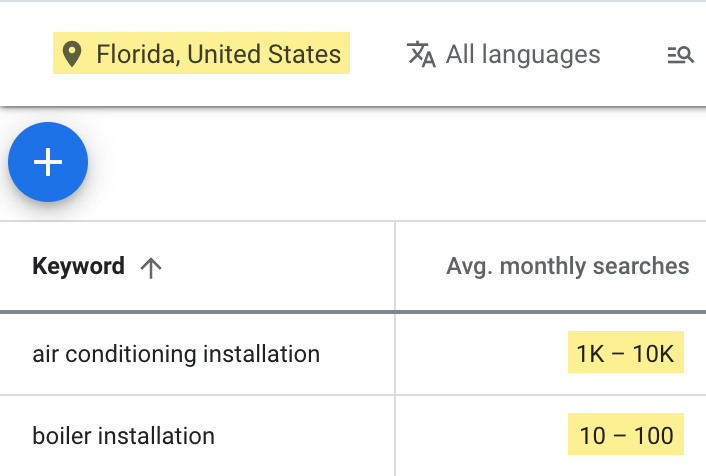
Unfortunately, there are problems with the Google Keyword Planner tool:
- It displays wide ranges of search volume (e.g. 1-10,000) rather than absolute numbers.
- The tool groups keywords and displays the total rounded search volume.
This makes checking the relative popularity of keywords at national level more productive. This is because what happens in one city is likely to be similar in another.
You can do this by using a keyword research tool such as Ahrefs' Keywords Explorer.
For example, the tool tells us that in the UK, more people search for 'boiler repair' than 'boiler installation'.

This is probably the case in any city we are in, so it is a great way to prioritize keywords.
Step 3. Check for local intent
Local intent means that searchers want to shop nearby. If this is not the case for your services, it is not a local SEO opportunity.
To check if a query is local, review it on Google and check the results.
If there is a map pack and/or local "blue link" results, it has a local purpose.
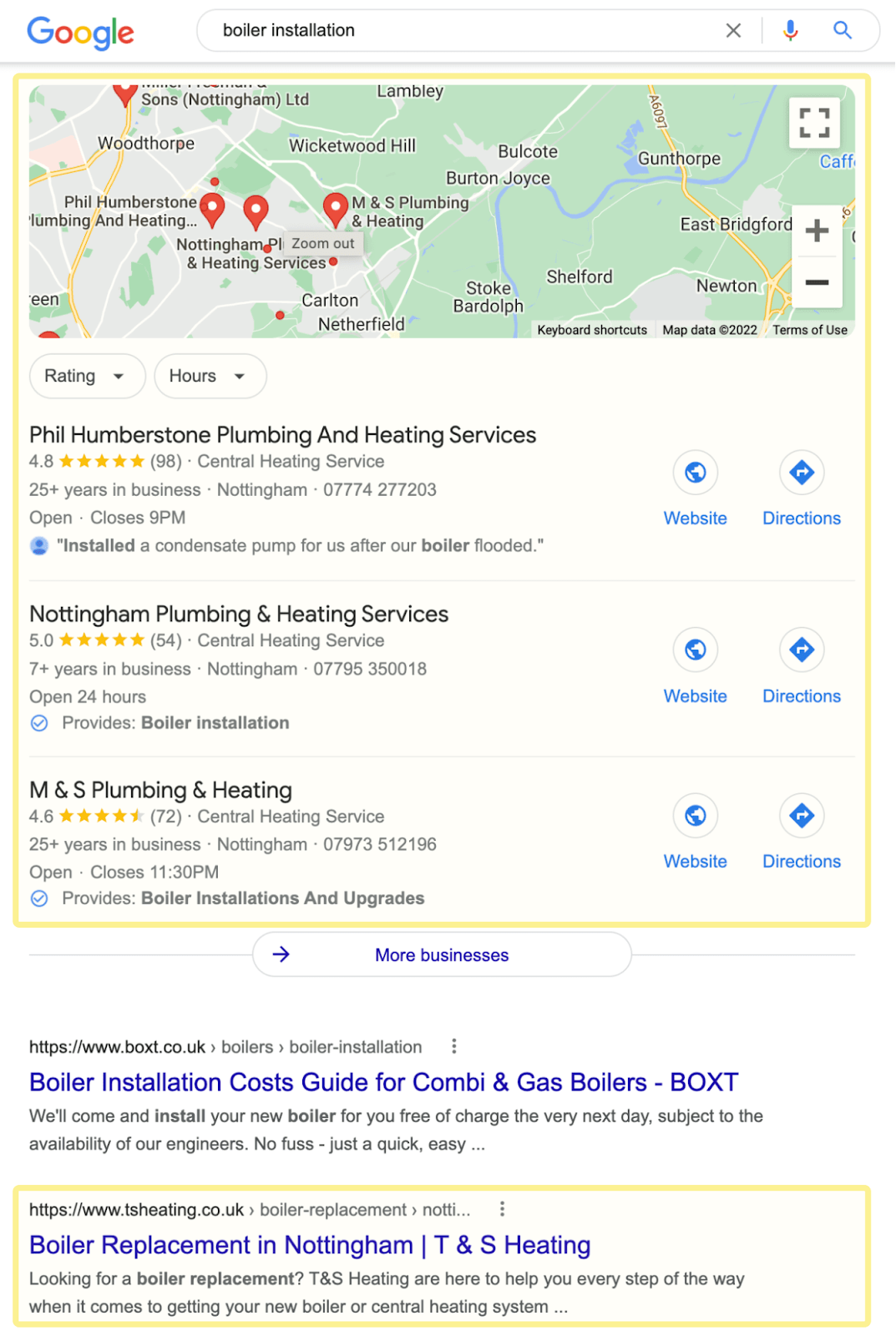
If there is no map pack and no local 'blue link' results, it does not have a local target.
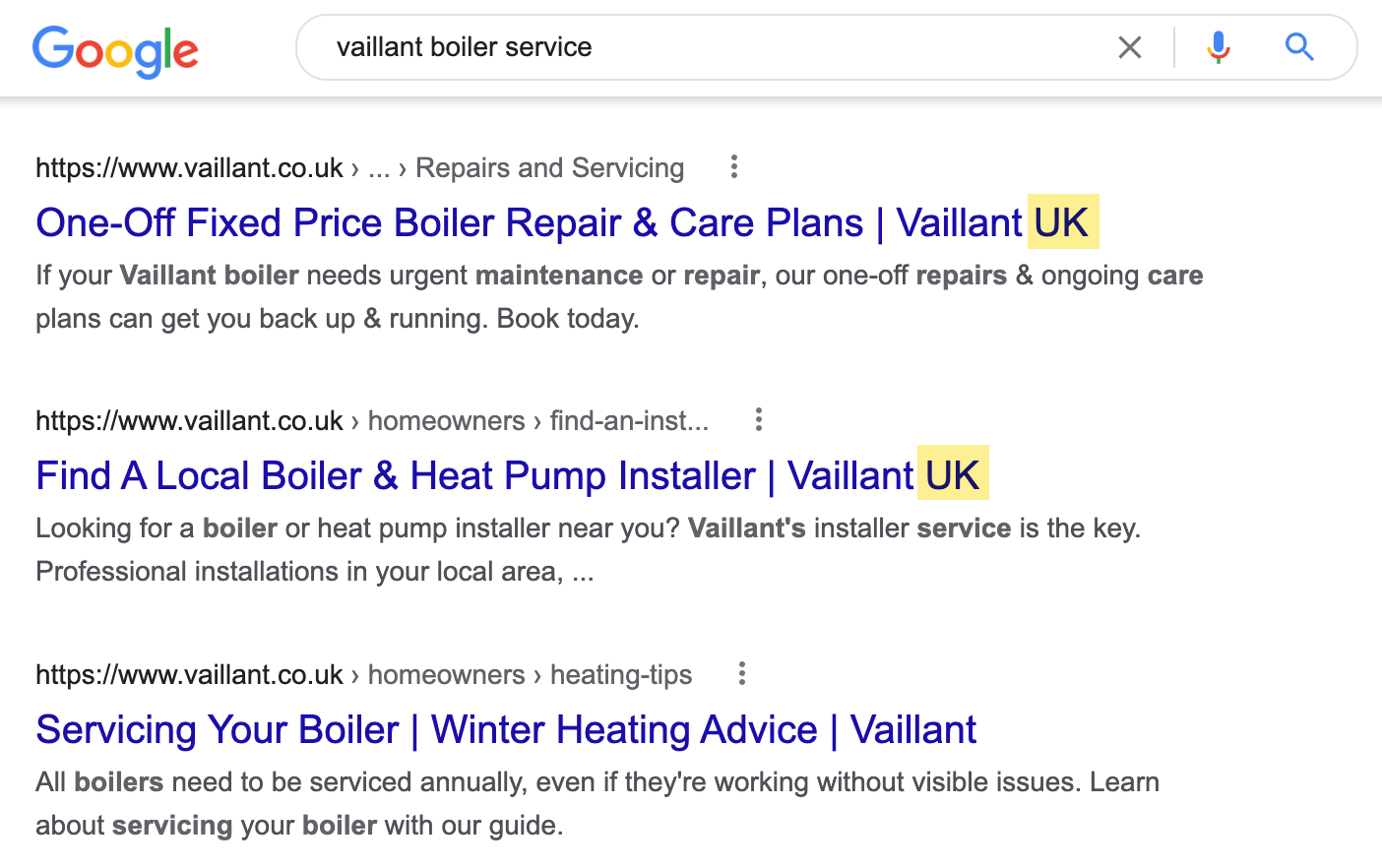
You can still target keywords without a local intent, but it does not work to improve your local SEO.
Step 4. Assign relevant keywords to pages
It is unlikely that your homepage will be ranked for all the keywords of all the services. So some will need to be assigned to separate pages.
To assign keywords to URLs, think about which services they are assigned to.
If they are assigned to very different services, e.g. 'boiler installation' and 'burst pipe repair', assign them to separate pages.
If they are linked to the same service, e.g. ' drain unblocking' and ' drain unclogging', assign them to the same page.
3. Local SEO ranking factors
You may remember that local SEO is a two-part game, because there are two ways to rank. The first is the map pack and the second is the "regular" organic results.
Ranking factors vary depending on where you want to rank, but some are important for both.
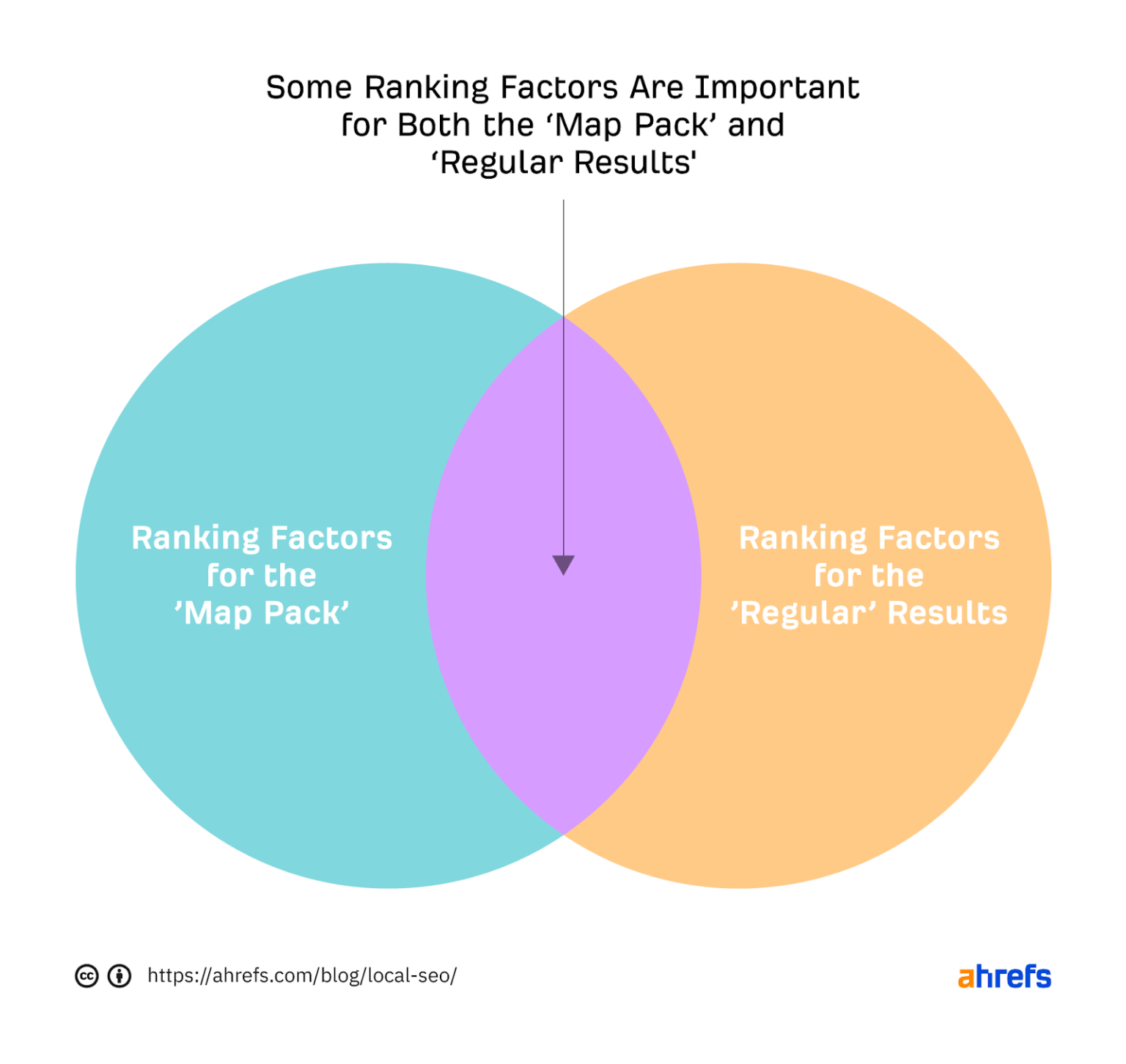
Below, we look at the factors that are most important for each of them.
Google Business Profile
Google Business Profile is a local listing with information about your business. It's free and allows your business to appear on the map pack and Google Maps.
What SEO experts say
According to a BrightLocal survey, a total of 36% of SEO specialists consider your Google Business Profile to be the most important ranking factor in the map pack. And 6% think it's important for getting "regular" organic results.
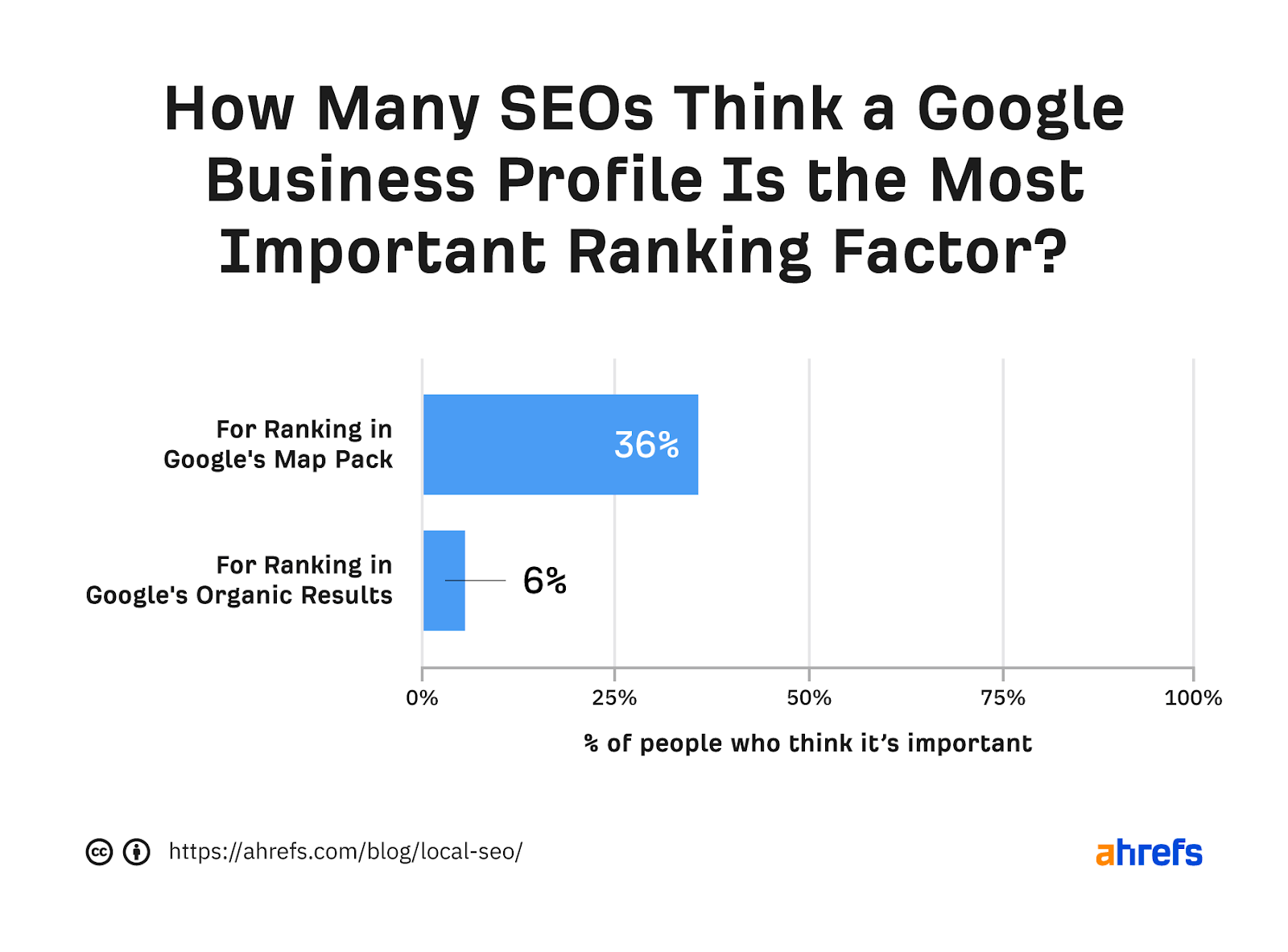
This is not surprising, as you need a Google Business Profile to have any chance of ranking in the Map Pack. The importance of company profile signals for the map pack is also increasing over time.
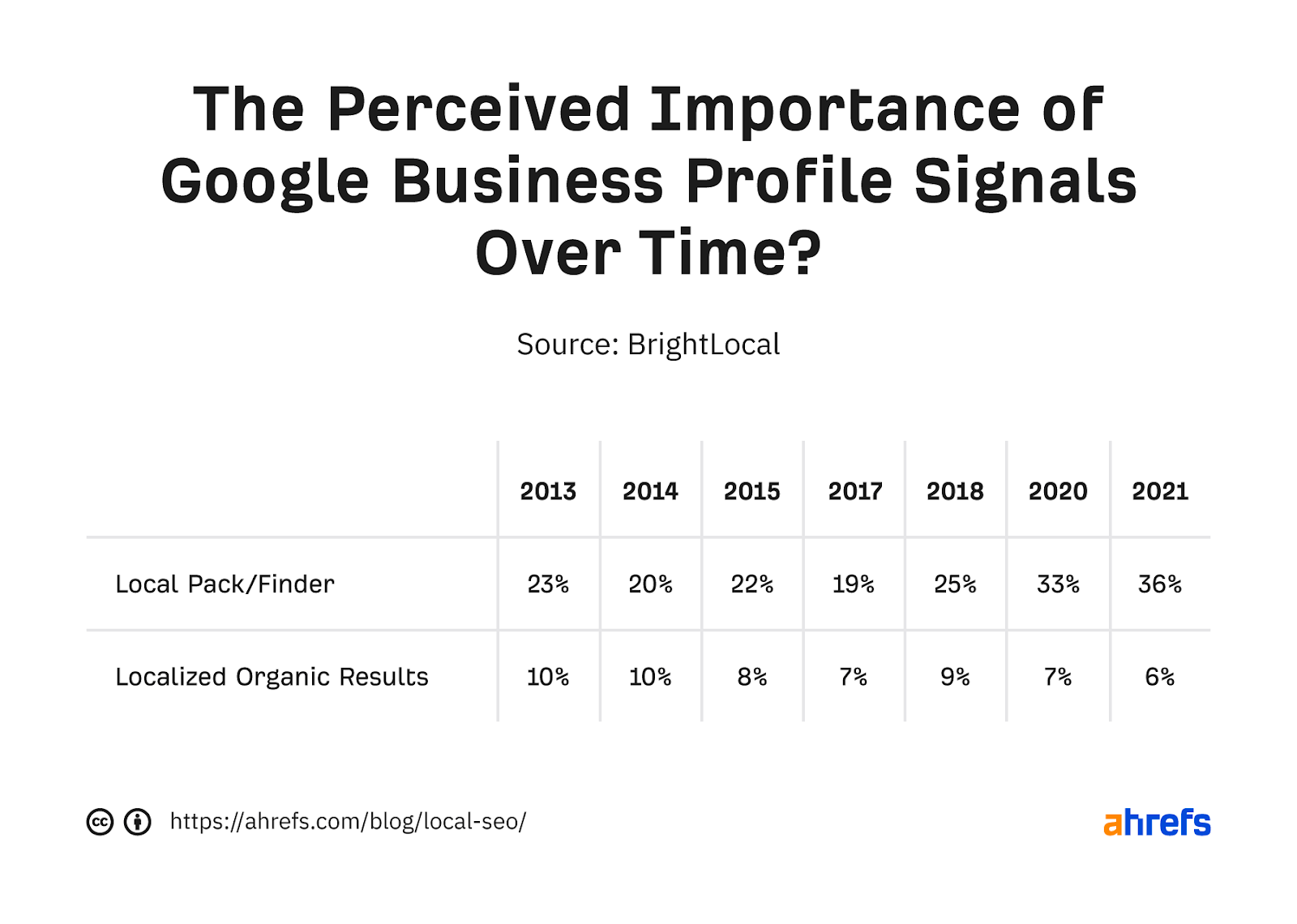
In addition to rankings, Google claims that customers are 70% more likely to visit businesses that have a complete Google Business Profile. They are also 50% more likely to consider buying from them. So it's clear that a complete and optimized business profile is essential if you want to attract more customers.
Best practices
Many of these best practices are used by Google itself:
- Be specific when defining your business category
- Define your opening hours (including holidays)
- Add your address (if you have a storefront)
- Define your service area (if you visit or deliver to customers)
- Add products or services offered
- Add photos
- Ask for customer feedback
NAP citations
A NAP citation online contains your business name, address and phone number. These are usually displayed in business directories and social media profiles.
For the record, there are also NAPW citations that mention your website.
What SEO experts say
In 2021, a BrightLocal study shows that 7% of SEOs believe that links are the most important ranking factor. This is true for both "map pack" and "regular" results.
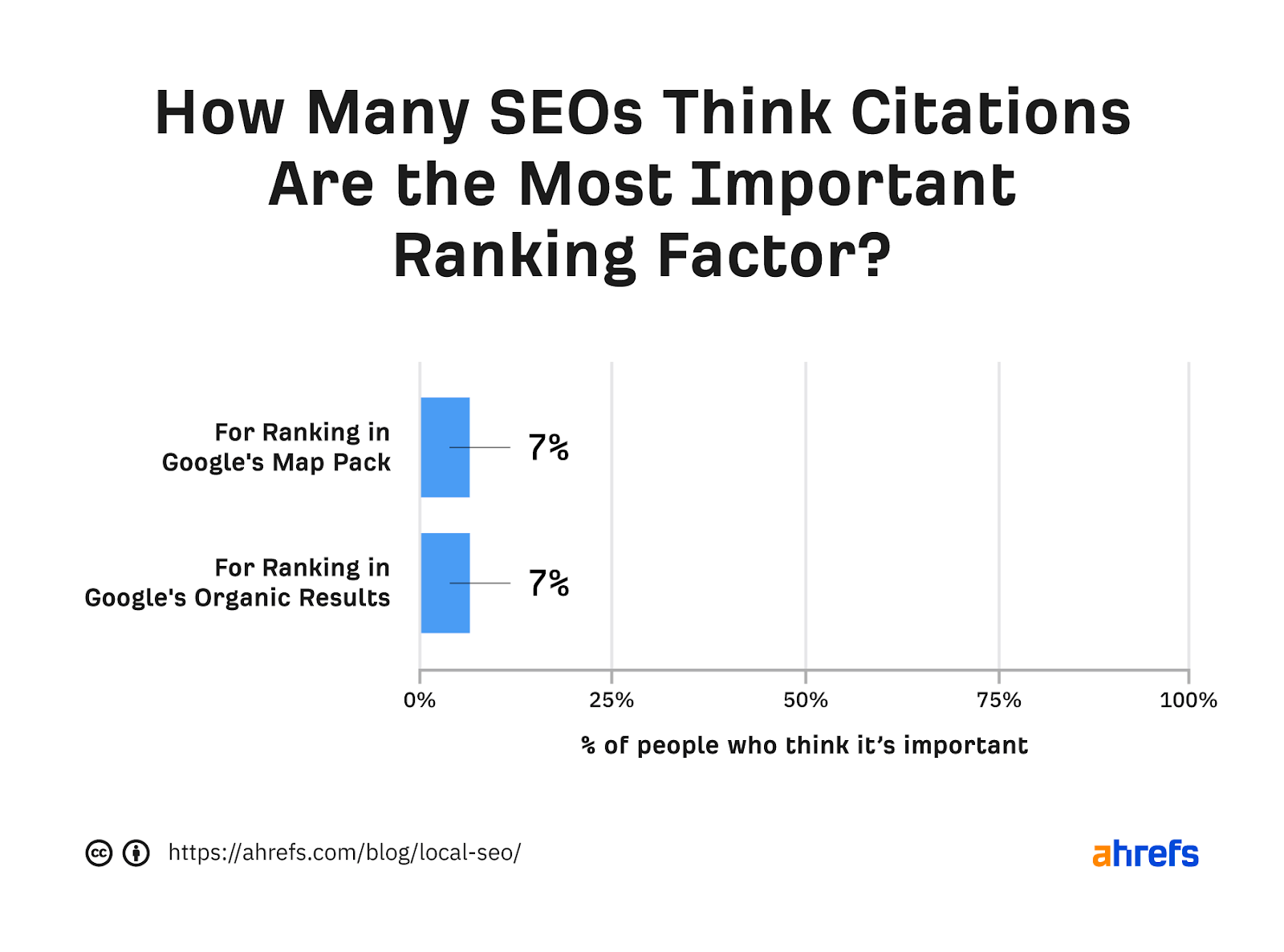
In other words, they are somewhat important, but not as important as before. The perceived importance of citations among SEOs has been decreasing since 2014.
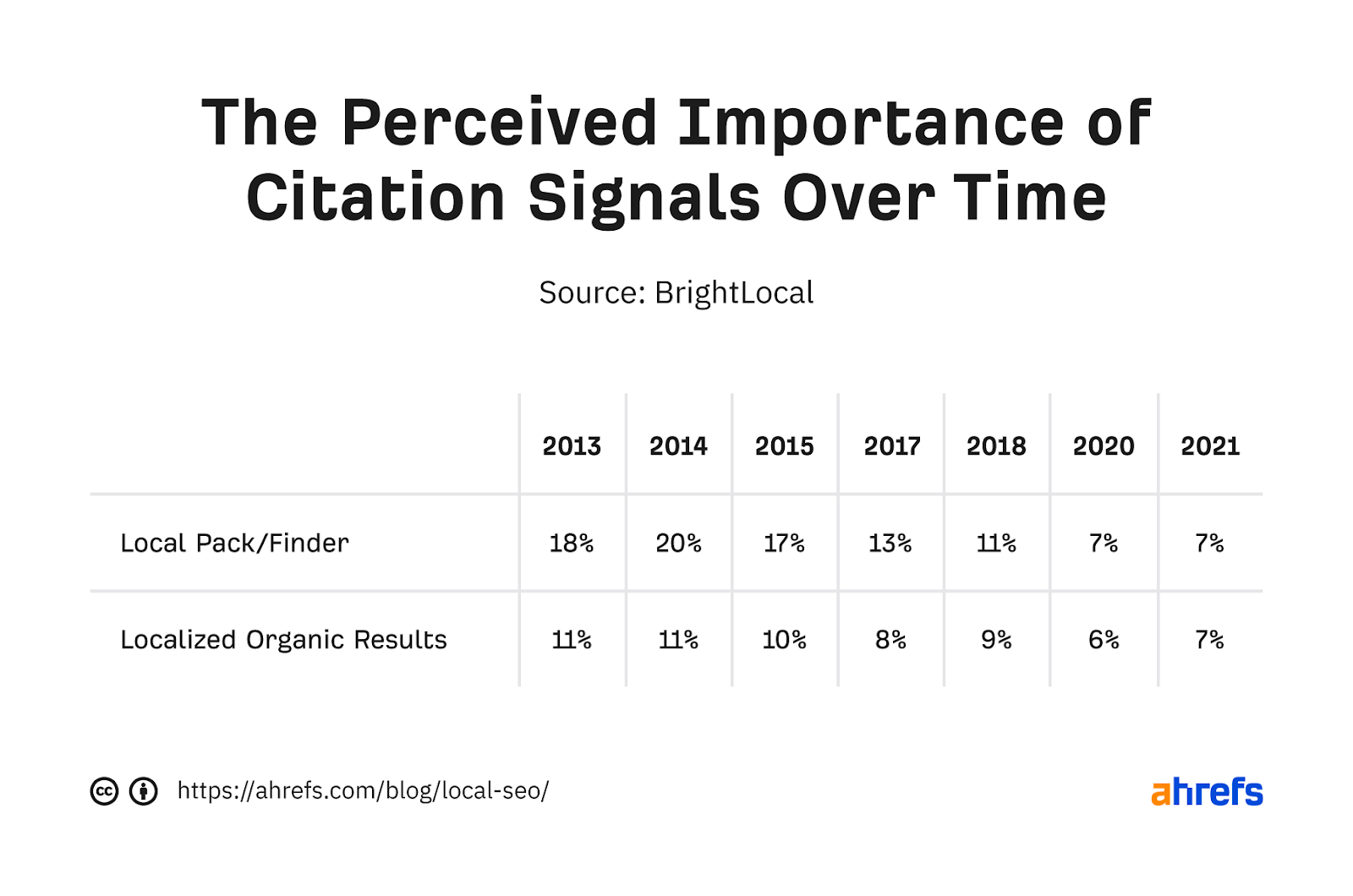
However, links can still help searchers find your business online. This is because directories often take up space in search results for local queries. So if you are in those directories, people can find your business by clicking on them in search results.
Best practices
- Join large databases (in the US these include Data Axle, Localeze and Foursquare)
- List your information on other large portals (in the US this includes Apple Maps, Yelp, Yellow Pages, Bing Places and Facebook)
- Submit information to other popular directories in your area and field of activity
- Links should be consistent across the board (same name, address, phone number).
TIP
Here's a quick way to find directories in your area and local directories:
- Paste the home page into Site Explorer.
- Go to the Link Intersect.
- Enter the homepages of several competing businesses in your area
- Set the search mode to "URL"
- Click "Show link opportunities" This will show you sites that link to one or more of your competitors, but not to you.
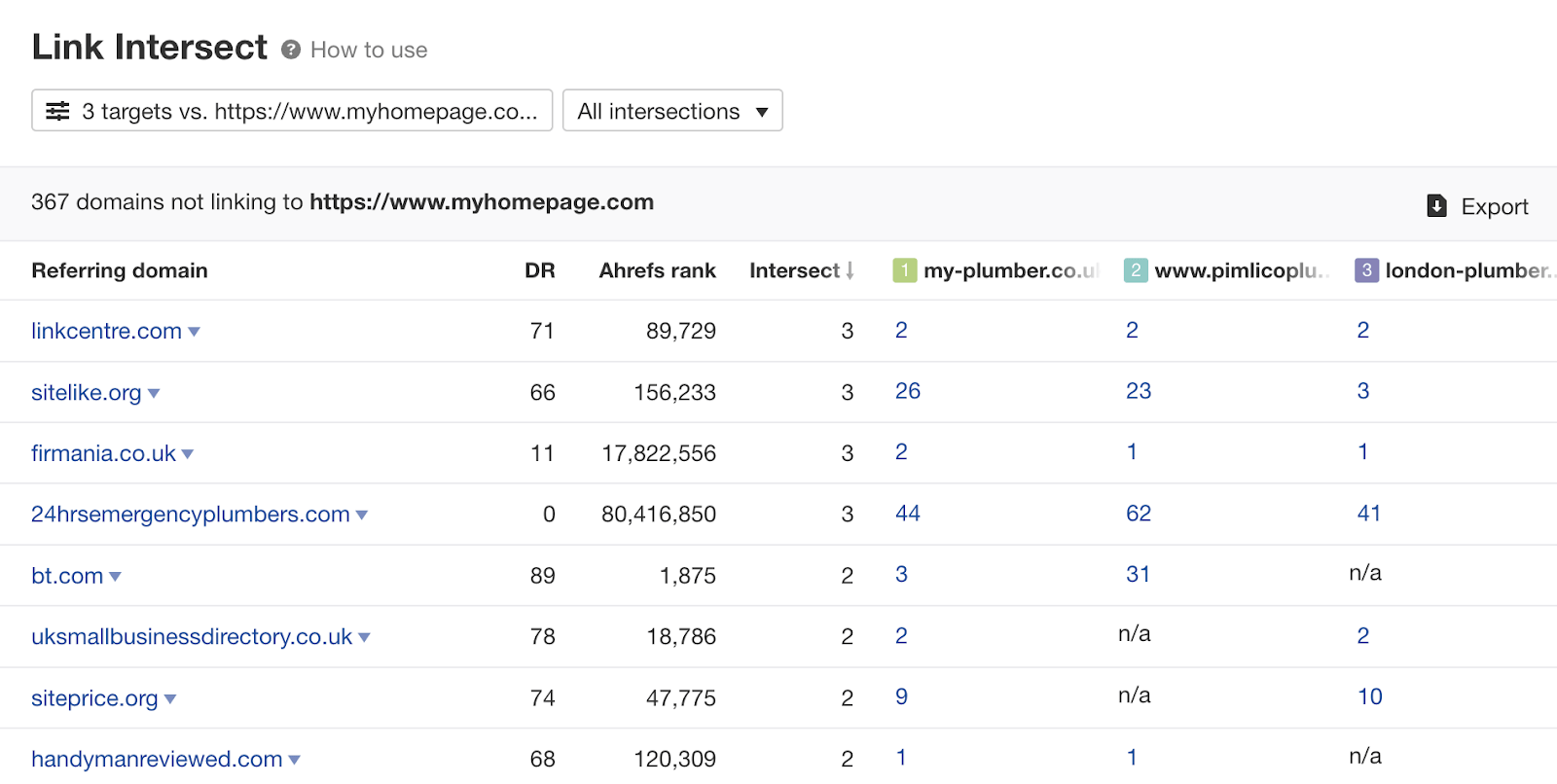
If a site is linking to many competitors, it is probably a directory where you can also add your business listing.
Reviews
Reviews indicate the quantity and quality of feedback on your Google Business Profile and elsewhere online.
What SEO experts say
A 2021 BrightLocal study shows that 17% of SEO specialists consider reviews to be the most important ranking factor for map packages. However, only 5% believe they are most important for organic ranking.
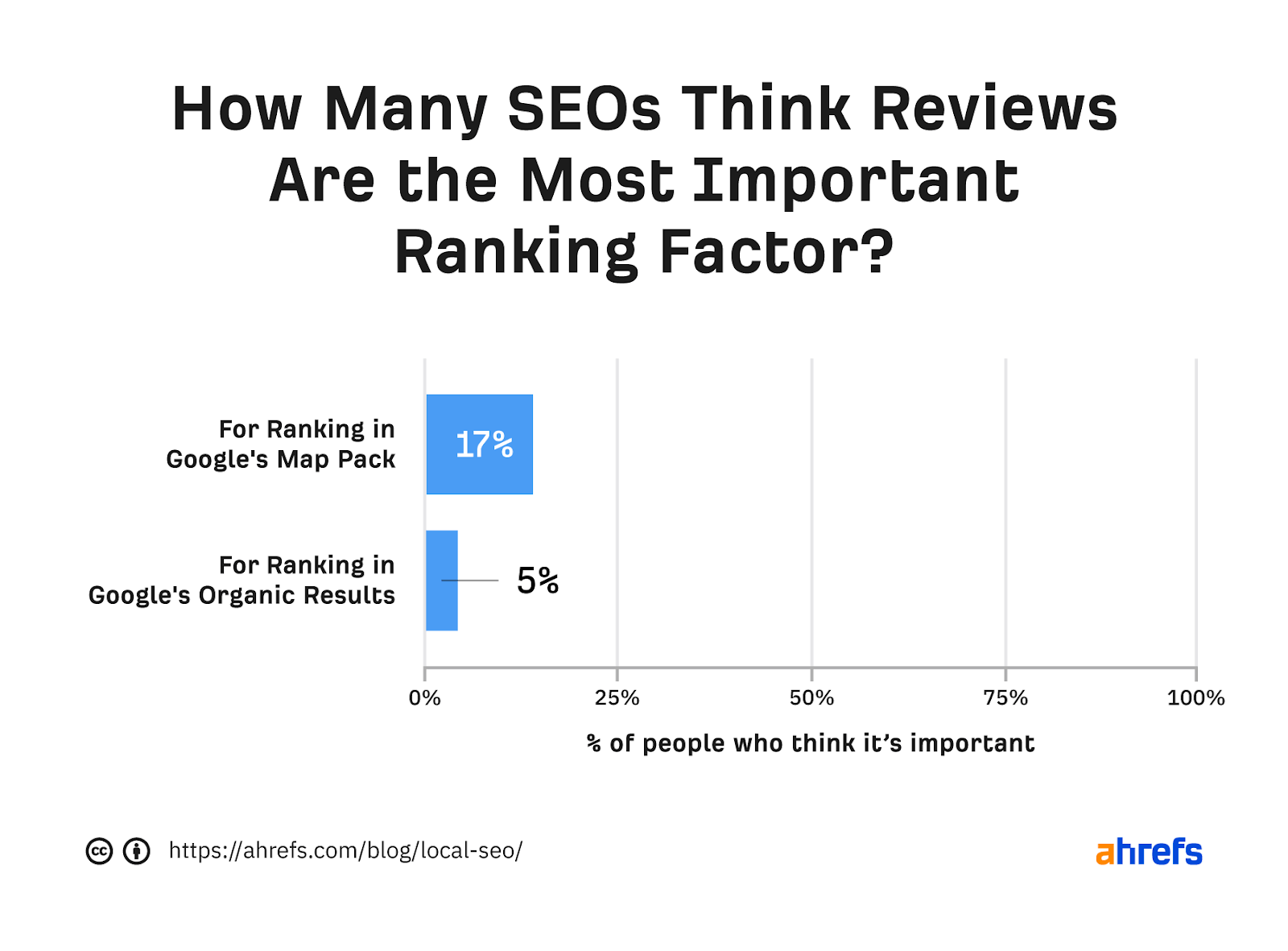
The importance of reviews for ranking map packs has also increased over the last few years.
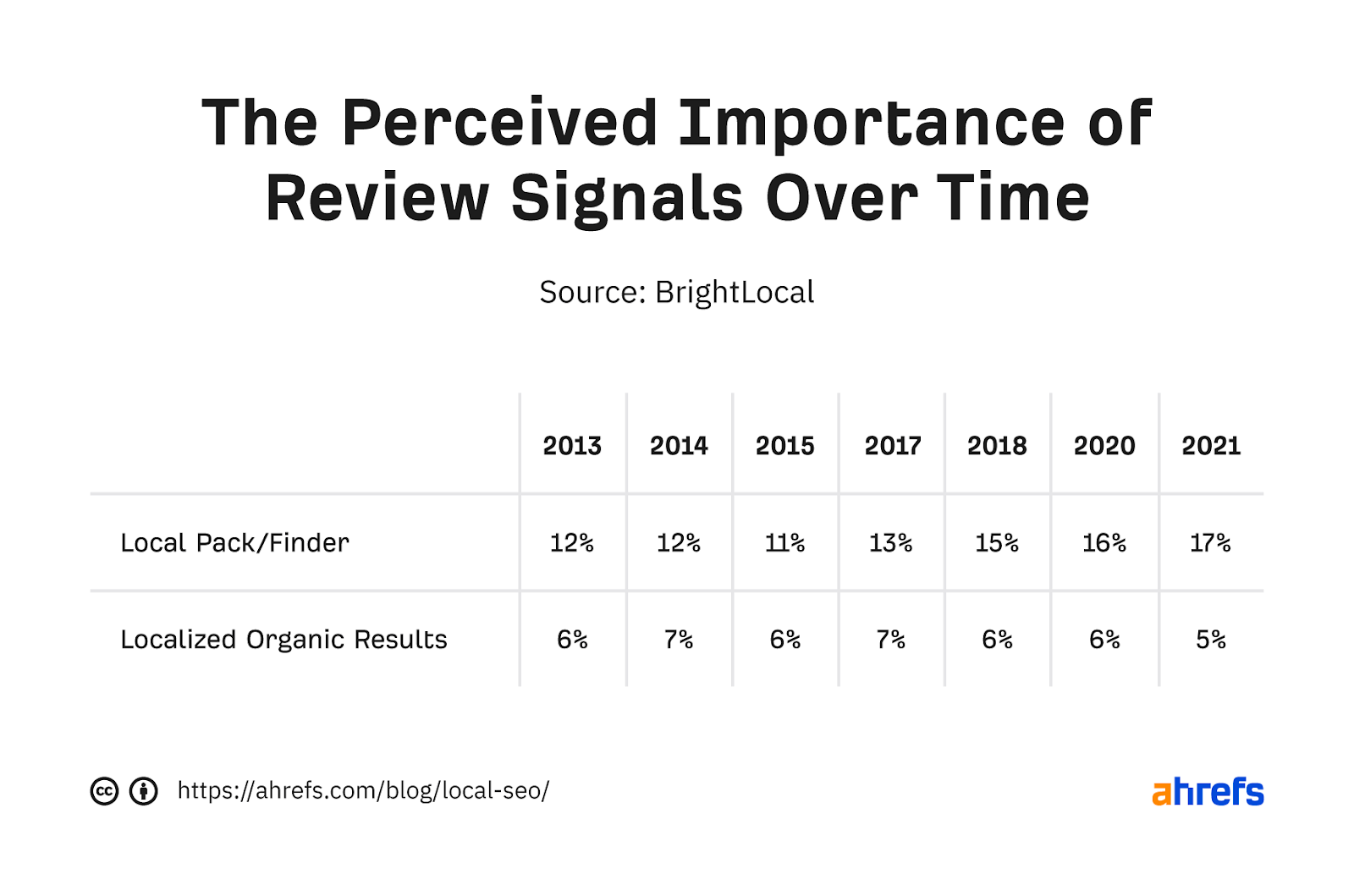
But reviews are not only about ratings. "Google's company profile and other reviews build trust between Google and its customers.
Best practices
Many of these best practices for getting more reviews are provided by Google itself:
- Remind customers to leave reviews (you can create and share a review link in Google Business Manager)
- Focus on getting reviews on your Google Business Profile
- Respond to reviews to build trust (you will need a verified Google Business Profile to do this)
- Don't offer or accept money in exchange for reviews (this is against Google's policy)
- Don't encourage bad reviews and don't ask for good reviews from customers (this is against Google's policy)
Backlinks
Backlinks act as votes for your website from other websites.
What SEO experts say
"BrightLocal research shows that 31% of SEOs consider links to be the most important ranking signal in regular organic search. 13% consider it important for map pack rankings.
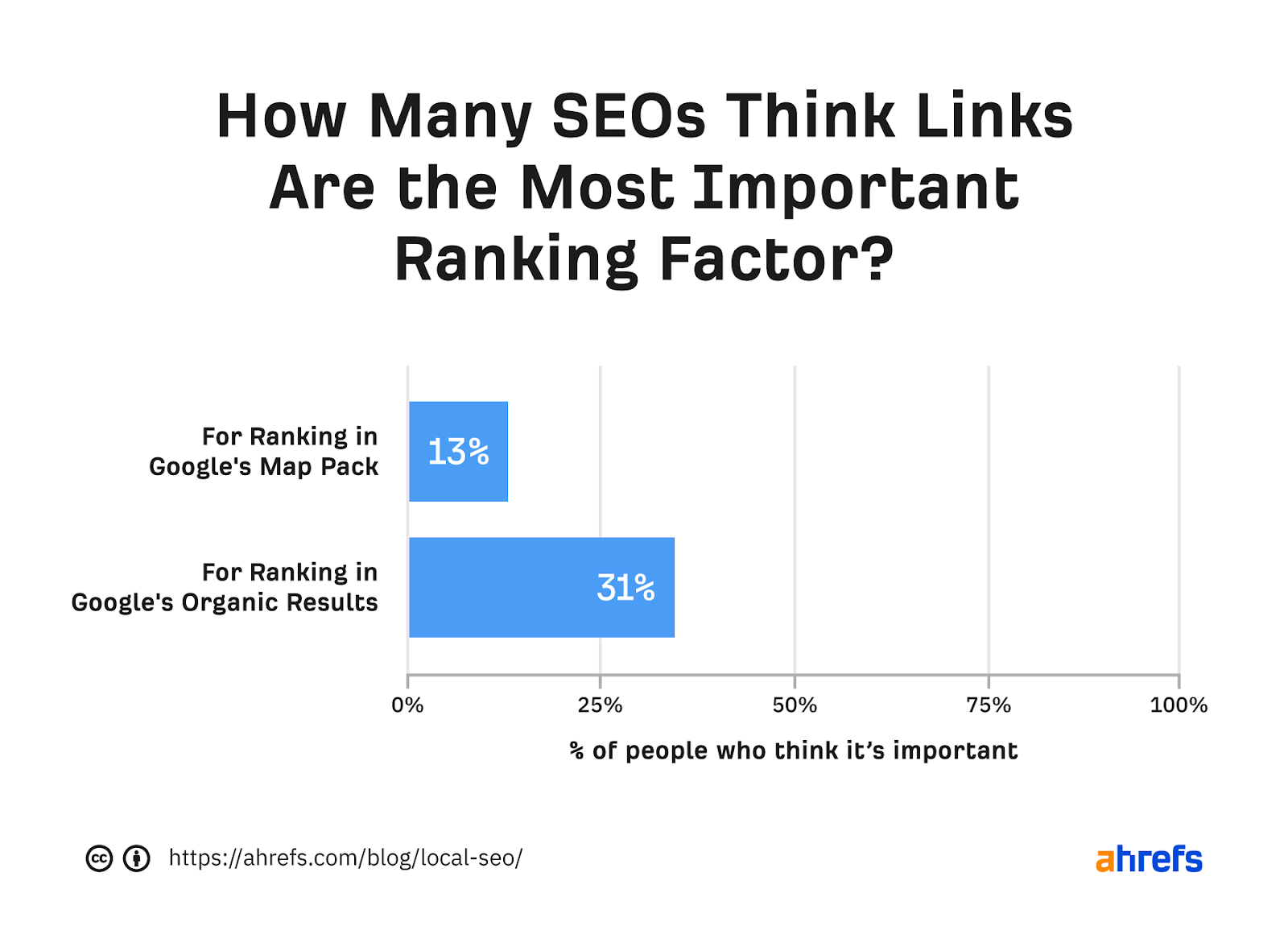
For many, this will not come as a big surprize. Back in 2016, Google said that backlinks are one of the three most important ranking factors. In addition, many studies have found a strong correlation between links and organic traffic.
For many, this will not come as a big surprize. Back in 2016, Google said that backlinks are one of the three most important ranking factors. In addition, many studies have found a strong correlation between links and organic traffic.
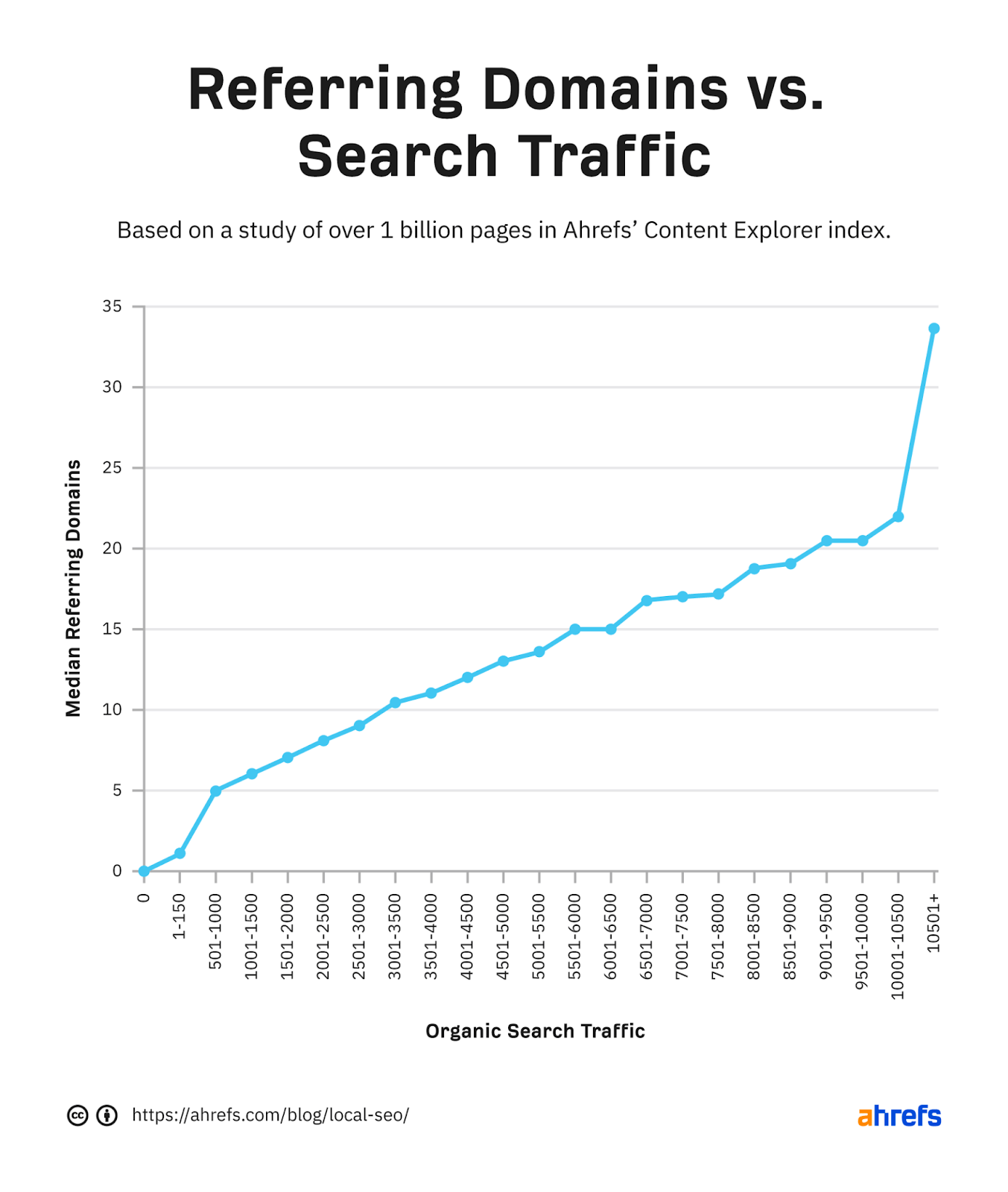
The importance of backlinks for "regular" local ranking is increasing over time. Meanwhile, their perceived importance for the rankings of map packs has remained almost the same.
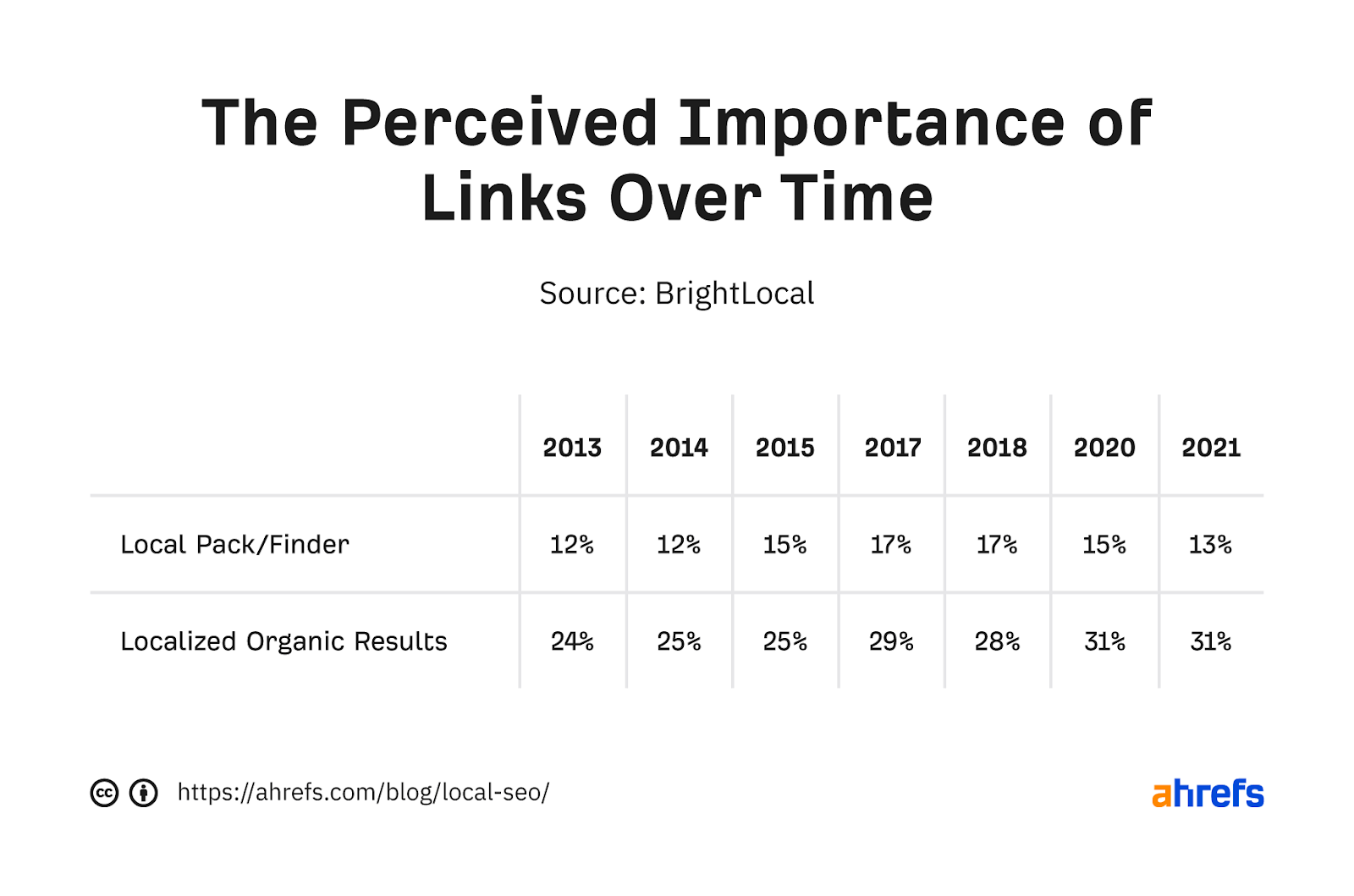
Best practices
- Get links from other top websites
- Get links that your competitors have (use Ahrefs' Link Intersect tool for this)
- Get local citations (NAP citations), as they can often add a link
- Ask for links in mentions of your business
- Recover lost links by redirecting old versions of pages to new ones
On-page SEO
On-page SEO is about changing the content of a page so that it ranks higher in organic search results.
What SEO experts say
BrightLocal research shows that 34% of SEO specialists believe that on-page signals are the most important factor in a regular organic search. And 16% consider them to be the most important factor in determining the rankings of map packs.
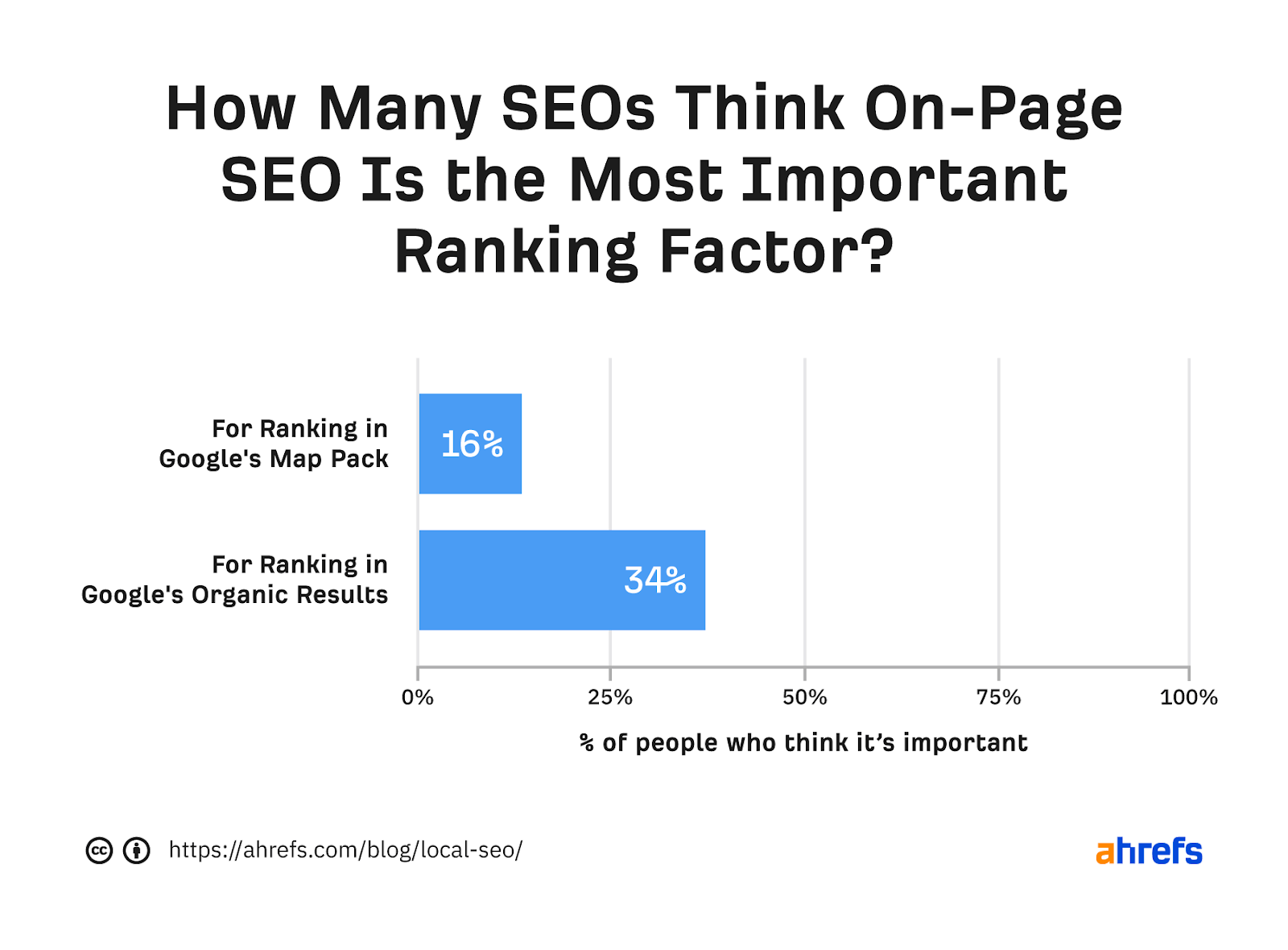
Best practices
- Tailor your pages for search intent
- Include your NAP information on your website
- Write compelling meta titles and meta descriptions
- Use URLs that are accurately described and SEO-friendly
- Optimize your images and photos
- Link to pages with internal links where appropriate
- Include information relevant to searchers
TIP
One way to find relevant information for searchers is to check what the top-ranking pages in your area are talking about. You can do this by looking at the pages. Alternatively, you can use Keywords Explorer to find keywords mentioned on top-ranking pages.
Here's how to do it:
- Enter [service keyword] [location] (e.g. "boiler repair London")
- Go to the "Matching terms" report
- Click on "Also talk about" and "Top 10"
Here are some of the most frequently mentioned keywords on the top ranking pages for "boiler repairs London" and what they can do:
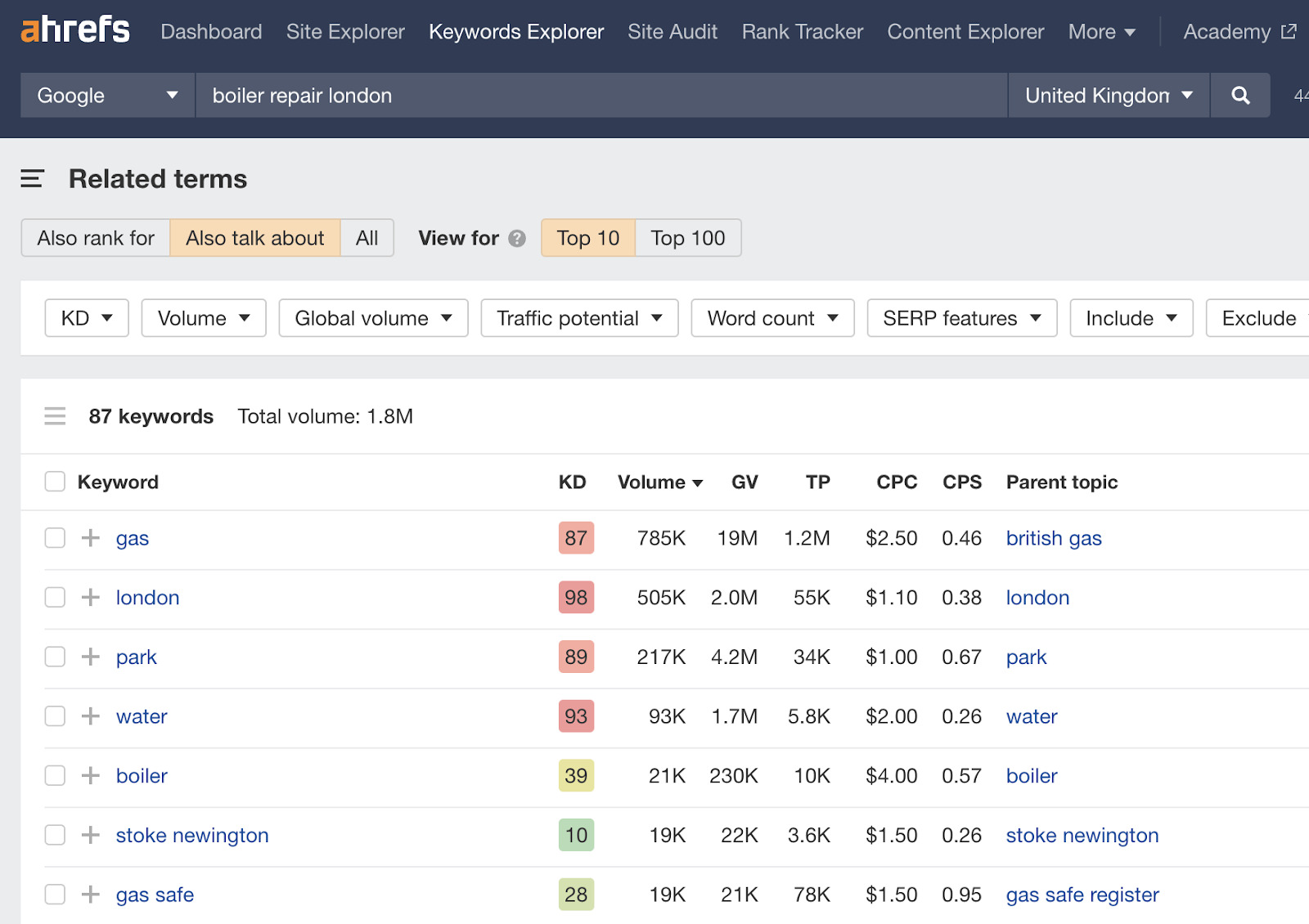
- "gas safe" - those looking for an engineer are likely to need one who is on the Gas Safe Register, the UK's official gas safety body.
- "greater london" - those looking will probably want to find out if the company provides this service in their area.
- "gas boiler - searchers probably want to know if the company can repair their type of boiler.
- 'emergency call' - searchers probably want to know if the company provides emergency calls.
It is worth mentioning these things on your page.
4. Local SEO tools
Let's close the topic with some local SEO tools that you may find useful.
Google Business Manager
Google Business Manager, formerly known as Google My Business, allows you to manage your Google business profile. It's completely free to sign up and should be used by every local business owner.
Google Search Console
Google Search Console) is a free tool to monitor your website's search performance. It tells you how much search traffic you're getting, where it's being directed and what keywords it's coming from.
Ahrefs' Rank Tracker
Rank Tracker allows you to monitor up to 10,000 "regular" organic search keyword rankings by country, state, city and even postcode.
Ahrefs Link Intersect
This Link Intersect tool allows you to find websites that link to your competitors. This is useful for finding relevant local and business area-specific link opportunities.
Grid My Business
Grid My Business displays the ranking positions of the map pack by keyword in your business area. It's free and useful for understanding if and where local searchers can see your business.
Yext
Yext is a tool for synchronizing and managing business information across multiple listings. It is useful for keeping links consistent, although you can do this manually.
Google Keyword Planner
Google Keyword Planner is Google's free keyword research tool and a useful reference source for search volume ranges at local level.
Original text: Ahrefs


